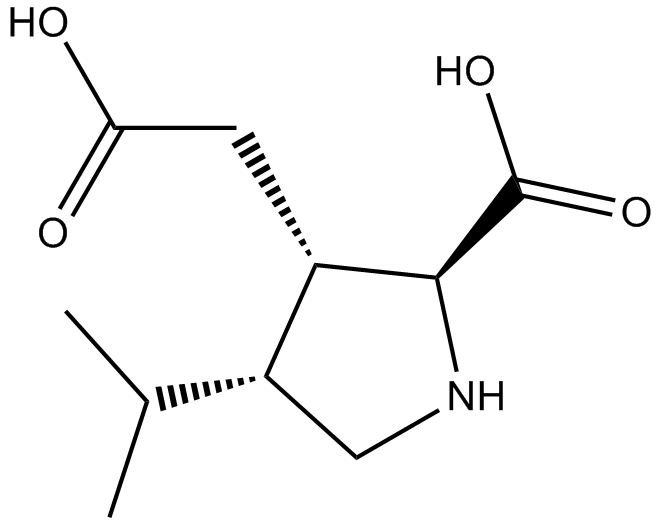Dihydrokainic acid (Synonyms: DHK) |
| Catalog No.GC14271 |
EAAT2(GLT1)-selective non-transportable inhibitor of L-glutamate and L-aspartate uptake
Products are for research use only. Not for human use. We do not sell to patients.

Cas No.: 52497-36-6
Sample solution is provided at 25 µL, 10mM.
Dihydrokainic acid (DHK) is an inhibitor of excitatory amino acid transporter 2 (EAAT2; Ki = 23 µM for glutamate uptake by COS cells expressing EAAT2).[1] It is selective for EEAT2 over EAAT1 and EAAT3 (Ki = >3 mM for both). DHK microinfusion (5 nmol) into the rat infralimbic cortex reduces the time spent immobile in the forced swim test, indicating antidepressant-like behavior, an effect that is blocked by the AMPA receptor antagonist NBQX and the serotonin (5-HT) receptor subtype 5-HT1A antagonist WAY-100635 .[2],[3] It also increases glutamate and serotonin levels and the expression of c-Fos in the dorsal raphe nucleus. In contrast, DHK microinjection (6.25 nmol) into the rat prefrontal cortex (PFC) increases the latency to drink sucrose in a sucrose intake test, indicating anhedonia-like behavior.[4] It also impairs memory acquisition, consolidation, and retrieval in mice in the novel object recognition test.[5]
Reference:
[1]. Arriza, J.L., Fairman, W.A., Wadiche, J.I., et al. Functional comparisons of three glutamate transporter subtypes cloned from human motor cortex. J. Neurosci. 14(9), 5559-5569 (1994).
[2]. Gasull-Camós, J., Tarrés-Gatius, M., Artigas, F., et al. Glial GLT-1 blockade in infralimbic cortex as a new strategy to evoke rapid antidepressant-like effects in rats. Transl. Psychiatry 7(2), e1038 (2017).
[3]. Gasull-Camós, J., Martínez-Torres, S., Tarrés-Gatius, M., et al. Serotonergic mechanisms involved in antidepressant-like responses evoked by GLT-1 blockade in rat infralimbic cortex. Neuropharmacology 139, 41-51 (2018).
[4]. John, C.S., Smith, K.L., Van't Veer, A., et al. Blockade of astrocytic glutamate uptake in the prefrontal cortex induces anhedonia. Neuropsychopharmacology 37(11), 2467-2475 (2012).
[5]. Tian, S.-W., Yu, X.-D., Cen, L., et al. Glutamate transporter GLT1 inhibitor dihydrokainic acid impairs novel object recognition memory performance in mice. Physiol. Behav. 199, 28-32 (2019).
Average Rating: 5 (Based on Reviews and 35 reference(s) in Google Scholar.)
GLPBIO products are for RESEARCH USE ONLY. Please make sure your review or question is research based.
Required fields are marked with *




















